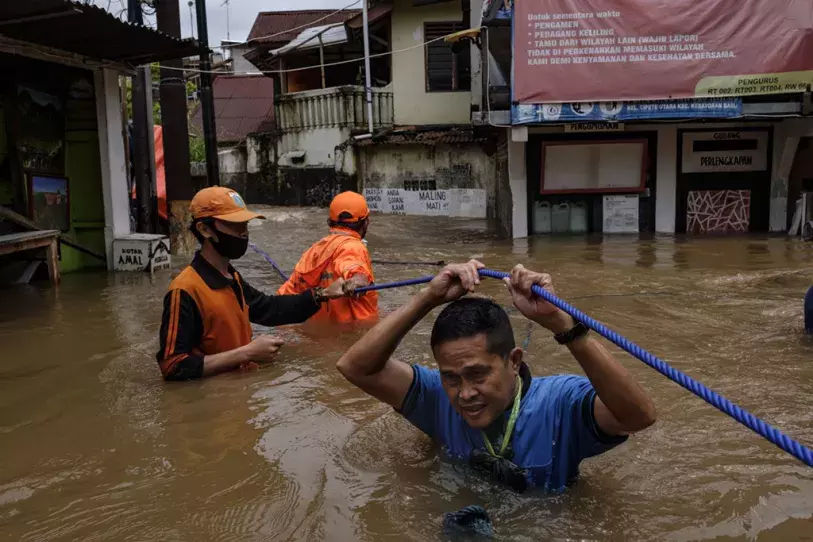Error message

But will the risky move really bring improvement?
Quick take:
- Jakarta’s frequent flooding and other environmental issues have prompted Indonesian leaders to plan a move to build a new capital amid the jungle of Borneo.
- Officials have high economic hopes, but realities such as water issues and weak sanitation infrastructure make such goals challenging.
- Neighborhood relocation measures to cope with Jakarta’s flooding have uprooted smaller communities within the megacity and added to growing socioeconomic inequality.
- Community activism born of such inequity has become an increasingly important part of the story.
HONOLULU (May 19, 2022) -- It has become a familiar sight in Indonesia’s flood-prone capital of Jakarta: People inching their way through waist-deep water to submerged homes. Islands of stranded trucks and cars. Entire neighborhoods underwater.
Perennial flooding in Jakarta caused by climate change, heavy rainfall and ongoing groundwater extraction uproots lives and disrupts communities — most recently in December when the city’s rivers last swelled. Some areas in the sprawling metropolis of 10.5 million people are sinking at a rate of close to eight inches a year. As a result, Indonesian officials have moved to carve a new capital out of the jungle on the island of Borneo to escape the inundation.
Massive transformations
In a recent online seminar, East-West Center Research Fellow Micah Fisher, an expert in disaster risk management and environmental community planning, said that Jakarta’s story is one of enormous change as it grapples with critical flooding, water-supply and sanitation problems. The flooding has propelled political discussions about how to reshape cities, he said, but those redevelopment and relocation initiatives often impact the smaller communities and villages embedded along the river banks of the megacity.
“Greater Jakarta continues to undergo these massive transformations in how it's building—upwards as well as outwards—into this giant metropolitan area,” Fisher said. “Without the kind of infrastructure necessary to address things like flooding and basic water services, you can imagine the complexities in such rapid growth.”
Fisher, who has worked with the World Bank, Mercy Corps, Asia Foundation, and other international development organizations, moved to Jakarta in 2007 during one of its most severe floods. Although he now lives in Hawai‘i, he has continued to watch closely how government officials, international organizations and local community members are tackling the problem of flooding, along with other issues such as land subsidence, overcrowding and pollution.
Indonesian officials have high economic hopes, Fisher said, aiming to make the nation one of the world's top five economies by 2045. But World Bank economists predict that if water-related threats such as pollution, inadequate sanitation, sea level rise and unsustainable groundwater extraction are not addressed, he said, the country will actually likely experience a 7.3 percent loss in GDP by that time.
“If you don't deal with the issues of water, then there are very, very significant barriers to reaching those goals,” said Fisher. Even now, he said, rapid population growth is continuing to occur in areas where rivers are already stressed and polluted.
Relocation distress
Plans are already in motion to create a new city for Indonesia’s administrative capital in remote East Kalimantan province on the large island of Borneo. One of the difficulties with that proposition, however, is that the East Kalimantan region has environmental challenges of its own, such as forest fires.
“Activists are really challenging this idea that there ‘aren't disasters in a place like East Kalimantan,’ where the water quality issues are already very, very stark, and where the fires and haze are becoming increasing seasonal issues,” Fisher said. Environmental activists have posed the question, “Is this going to save Jakarta, or just create new problems elsewhere?” he added.
Even if the capital is moved to East Kalimantan, Jakarta’s repeated flooding will not go away. It has already required the relocation of certain neighborhoods, resulting in tensions between politicians and community members. Villagers who were evicted from their homes in 2015, for example, felt swindled after a former governor did not follow up on his promise of compensation to those who moved, said Fisher, who conducts weekly Zoom meetings with affected Jakarta residents. Community members have complained of other false promises, he said, such as a pledge that the first three months of rent in new public housing would be free. Instead, residents who moved there ended up having to pay right from the start.
The community activism that emerged due to the distressing way the evictions took place, Fisher said, “is really an important and often overlooked factor about this. There was just a real sense of being cheated.”
One flood-prone community was essentially split in two after public housing was only available for about half of them, he said. And many of those who relocated to public housing have had difficulties finding work. One villager told him: “Back when we were flooded, at least we owned our homes. Now we worry about how we will make enough to pay rent each month.”
Uncertain future
Future rainfall patterns in the area are forecast to increase in intensity and become more unpredictable, causing flooding in unexpected places. Meanwhile, Jakarta continues to grow in size and population as ever more Indonesians migrate there, both seasonally and permanently, in search of opportunity.
As new plans to redesign the city unfold, Fisher said, it's important to consider how they will affect the most vulnerable. “When you think about the changing face of Jakarta … and the large droves of people continuing to migrate to this region, it really does raise the question of: ‘Jakarta, for whom?’ he posed. “It's unclear, still, what will become of this coastal area.”
Photo: Rescue workers help a man evacuate during flooding in Jakarta in early 2021. Credit: Ed Wray/Getty Images
But will the risky move really bring improvement?
Quick take:
- Jakarta’s frequent flooding and other environmental issues have prompted Indonesian leaders to plan a move to build a new capital amid the jungle of Borneo.
- Officials have high economic hopes, but realities such as water issues and weak sanitation infrastructure make such goals challenging.
- Neighborhood relocation measures to cope with Jakarta’s flooding have uprooted smaller communities within the megacity and added to growing socioeconomic inequality.
- Community activism born of such inequity has become an increasingly important part of the story.
HONOLULU (May 19, 2022) -- It has become a familiar sight in Indonesia’s flood-prone capital of Jakarta: People inching their way through waist-deep water to submerged homes. Islands of stranded trucks and cars. Entire neighborhoods underwater.
Perennial flooding in Jakarta caused by climate change, heavy rainfall and ongoing groundwater extraction uproots lives and disrupts communities — most recently in December when the city’s rivers last swelled. Some areas in the sprawling metropolis of 10.5 million people are sinking at a rate of close to eight inches a year. As a result, Indonesian officials have moved to carve a new capital out of the jungle on the island of Borneo to escape the inundation.
Massive transformations
In a recent online seminar, East-West Center Research Fellow Micah Fisher, an expert in disaster risk management and environmental community planning, said that Jakarta’s story is one of enormous change as it grapples with critical flooding, water-supply and sanitation problems. The flooding has propelled political discussions about how to reshape cities, he said, but those redevelopment and relocation initiatives often impact the smaller communities and villages embedded along the river banks of the megacity.
“Greater Jakarta continues to undergo these massive transformations in how it's building—upwards as well as outwards—into this giant metropolitan area,” Fisher said. “Without the kind of infrastructure necessary to address things like flooding and basic water services, you can imagine the complexities in such rapid growth.”
Fisher, who has worked with the World Bank, Mercy Corps, Asia Foundation, and other international development organizations, moved to Jakarta in 2007 during one of its most severe floods. Although he now lives in Hawai‘i, he has continued to watch closely how government officials, international organizations and local community members are tackling the problem of flooding, along with other issues such as land subsidence, overcrowding and pollution.
Indonesian officials have high economic hopes, Fisher said, aiming to make the nation one of the world's top five economies by 2045. But World Bank economists predict that if water-related threats such as pollution, inadequate sanitation, sea level rise and unsustainable groundwater extraction are not addressed, he said, the country will actually likely experience a 7.3 percent loss in GDP by that time.
“If you don't deal with the issues of water, then there are very, very significant barriers to reaching those goals,” said Fisher. Even now, he said, rapid population growth is continuing to occur in areas where rivers are already stressed and polluted.
Relocation distress
Plans are already in motion to create a new city for Indonesia’s administrative capital in remote East Kalimantan province on the large island of Borneo. One of the difficulties with that proposition, however, is that the East Kalimantan region has environmental challenges of its own, such as forest fires.
“Activists are really challenging this idea that there ‘aren't disasters in a place like East Kalimantan,’ where the water quality issues are already very, very stark, and where the fires and haze are becoming increasing seasonal issues,” Fisher said. Environmental activists have posed the question, “Is this going to save Jakarta, or just create new problems elsewhere?” he added.
Even if the capital is moved to East Kalimantan, Jakarta’s repeated flooding will not go away. It has already required the relocation of certain neighborhoods, resulting in tensions between politicians and community members. Villagers who were evicted from their homes in 2015, for example, felt swindled after a former governor did not follow up on his promise of compensation to those who moved, said Fisher, who conducts weekly Zoom meetings with affected Jakarta residents. Community members have complained of other false promises, he said, such as a pledge that the first three months of rent in new public housing would be free. Instead, residents who moved there ended up having to pay right from the start.
The community activism that emerged due to the distressing way the evictions took place, Fisher said, “is really an important and often overlooked factor about this. There was just a real sense of being cheated.”
One flood-prone community was essentially split in two after public housing was only available for about half of them, he said. And many of those who relocated to public housing have had difficulties finding work. One villager told him: “Back when we were flooded, at least we owned our homes. Now we worry about how we will make enough to pay rent each month.”
Uncertain future
Future rainfall patterns in the area are forecast to increase in intensity and become more unpredictable, causing flooding in unexpected places. Meanwhile, Jakarta continues to grow in size and population as ever more Indonesians migrate there, both seasonally and permanently, in search of opportunity.
As new plans to redesign the city unfold, Fisher said, it's important to consider how they will affect the most vulnerable. “When you think about the changing face of Jakarta … and the large droves of people continuing to migrate to this region, it really does raise the question of: ‘Jakarta, for whom?’ he posed. “It's unclear, still, what will become of this coastal area.”
Photo: Rescue workers help a man evacuate during flooding in Jakarta in early 2021. Credit: Ed Wray/Getty Images
East-West Wire
News, Commentary, and Analysis
The East-West Wire is a news, commentary, and analysis service provided by the East-West Center in Honolulu. Any part or all of the Wire content may be used by media with attribution to the East-West Center or the person quoted. To receive East-West Center Wire media releases via email, subscribe here.
For links to all East-West Center media programs, fellowships and services, see www.eastwestcenter.org/journalists.







